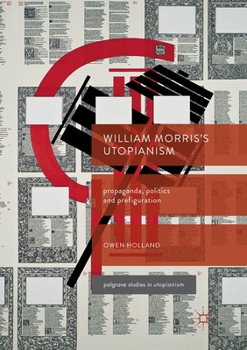William Morris's Utopianism: Propaganda, Politics and Prefiguration
This book offers a new interpretation of William Morris's utopianism as a strategic extension of his political writing. Morris's utopian writing, alongside his journalism and public lectures, constituted part of a sustained counter-hegemonic project that intervened both into the life-world of the fin de si cle socialist movement, as well as the dominant literary cultures of his day. Owen Holland demonstrates this by placing Morris in conversation with writers of first-wave feminism, nineteenth-century pastoralists, as well as the romance revivalists and imperialists of the 1880s. In doing so, he revises E.P. Thompson's and Miguel Abensour's argument that Morris's utopian writing should be conceived as anti-political and heuristic, concerned with the pedagogic education of desire, rather than with the more mundane work of propaganda. He shows how Morris's utopianism emerged against the grain of the now-here, embroiled in instrumental, propagandistic polemic, complicating Thompson'sand Abensour's view of its anti-political character.
Format:Paperback
Language:English
ISBN:3319866613
ISBN13:9783319866611
Release Date:August 2018
Publisher:Palgrave MacMillan
Length:337 Pages
Weight:0.93 lbs.
Dimensions:0.7" x 5.8" x 8.3"
Customer Reviews
0 rating





